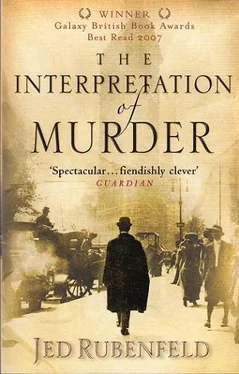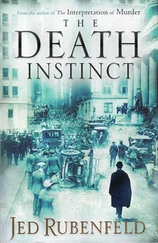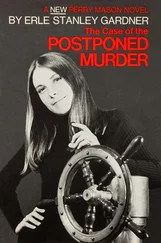Jed Rubenfeld - The Interpretation of Murder
Здесь есть возможность читать онлайн «Jed Rubenfeld - The Interpretation of Murder» весь текст электронной книги совершенно бесплатно (целиком полную версию без сокращений). В некоторых случаях можно слушать аудио, скачать через торрент в формате fb2 и присутствует краткое содержание. Жанр: Исторические приключения, на английском языке. Описание произведения, (предисловие) а так же отзывы посетителей доступны на портале библиотеки ЛибКат.
- Название:The Interpretation of Murder
- Автор:
- Жанр:
- Год:неизвестен
- ISBN:нет данных
- Рейтинг книги:5 / 5. Голосов: 1
-
Избранное:Добавить в избранное
- Отзывы:
-
Ваша оценка:
- 100
- 1
- 2
- 3
- 4
- 5
The Interpretation of Murder: краткое содержание, описание и аннотация
Предлагаем к чтению аннотацию, описание, краткое содержание или предисловие (зависит от того, что написал сам автор книги «The Interpretation of Murder»). Если вы не нашли необходимую информацию о книге — напишите в комментариях, мы постараемся отыскать её.
The Interpretation of Murder — читать онлайн бесплатно полную книгу (весь текст) целиком
Ниже представлен текст книги, разбитый по страницам. Система сохранения места последней прочитанной страницы, позволяет с удобством читать онлайн бесплатно книгу «The Interpretation of Murder», без необходимости каждый раз заново искать на чём Вы остановились. Поставьте закладку, и сможете в любой момент перейти на страницу, на которой закончили чтение.
Интервал:
Закладка:
I did so. With the tiepin in hand, I could see the outline of an unmistakably similar ligature insignia in the dark round spot in the photograph. 'They're alike,' I said.
'Yup,' said Littlemore, 'almost identical. Only problem is, according to Riviere, they shouldn't be alike. They should be opposites. I don't get that. Know where we found that tiepin? In the Actons' backyard. To me, that pin proves Banwell was at the Actons', climbing a tree, maybe, to get in Miss Acton's window.' He sat down on a chair, his right leg evidently too sore for him to stand on. 'You still think it was Banwell, right, Doc?'
'I do.'
'You got to come with me to the mayor's office,' said the detective.
Smith Ely Jelliffe, lodged comfortably in a front-row seat at the Hippodrome, the world's largest indoor theater, wept quietly. So did most of his fellow playgoers. The spectacle so moving to them was the solemn march of the diving girls, sixty-four in all, into the seventeen-foot-deep lake that was part of the Hippodrome's gigantic stage. (The water in the lake was real; underwater air receptacles and subterranean corridors provided an escape route backstage.) Who could keep tears away as the lovely, dignified, bathing- suited girls disappeared into the rippling water, never to see Earth again, doomed to perform forever for the Martian king in his circus so far away from home?
Jelliffe's bereavement was alleviated by the knowledge that he would be seeing two of the girls again — and shortly. A half hour later, with a high-heeled diving girl on each arm, Jelliffe strode with considerable satisfaction into the colonnaded dining room of Murray's Roman Gardens on Forty- second Street. Behind Jelliffe trailed two long pink boas, one from each of his girls. Before him stood the Gardens' massive, leafy plaster columns, rising up to the ceiling a hundred feet overhead, where electric stars twinkled and a gibbous moon crossed the firmament at an unnaturally advanced clip. A triple-decker Pompeiian fountain discoursed in the center of the restaurant, while nude maidenly figures frolicked in the trompe-l'oeil distance on every wall.
By weight, Jelliffe was worth both his diving girls put together. He believed this middle-aged girth made him a most impressive man — to the female sex, that is. He took special pleasure in his diving girls because he was anxious to make an impression tonight. He was dining with the Triumvirate. They had never asked him to dinner before. The closest he had come to their inner circle was the occasional luncheon at their club. But his stock had plainly risen with his connections to the new psychotherapeutics.
Jelliffe did not need money. What he wanted was renown, esteem, standing, prestige — all of which the Triumvirate could give him. It was they, for example, who directed Harry Thaw's lawyers to him, giving Jelliffe his first taste of fame. The grandest day of his life was the day his portrait appeared in the Sunday papers, naming him 'one of the most distinguished alienists in the state.'
The Triumvirate had also taken a surprisingly close interest in his publishing house. They were obviously progressive men. At first they had barred him from accepting any articles mentioning psychoanalysis, but their attitude had changed. Roughly a year ago, they instructed Jelliffe to send them the abstracts of all submissions touching on Freud, notifying him afterward of the ones they sanctioned. It was the Triumvirate who advised him to publish Jung. It was they who encouraged him to take on Brill's translation of Freud's book when it looked like Morton Prince in Boston might publish it instead. Indeed, they had hired Jelliffe an editor to help smooth Brill's translation.
Jelliffe had considered carefully the number of girls to bring to dinner. Girls were his specialty. He had cemented more than a few social and professional connections with such mortar. He knew all the best gentlemen's establishments. When asked, he invariably recommended the Players Club in Gramercy Park. With the Triumvirate, Jelliffe had never been asked. When, however, they invited him to join them at the Roman Gardens, Jelliffe sensed the occasion was propitious. As every man-about-town knew, upstairs at the Gardens were twenty-four luxuriously appointed bachelor's apartments, each of which contained a double-sized bed, separate bath, and a bottle of champagne on ice. At first, Jelliffe had pictured four girls and four rooms, but on reflection this seemed insufficiently collegial. So he had secured two of each: the business of taking turns, he felt, would add sauce to the geese.
Jelliffe did make an impression, but not the one he intended. Shown to the private alcove where the Triumvirate had their table, the bon vivant and his ladies met with an unequivocal froideur from the three gentlemen seated there. None of them even stood. Jelliffe, failing to detect the cause, manfully greeted his hosts, called out to the ma i tre d' for extra chairs, and announced that two bachelor's suites awaited them all after dinner. With a wave of an elegant hand, Dr Charles Dana belayed the order for extra chairs. Jelliffe finally grasped the nettle and mumbled to his girls that they had better wait for him upstairs.
Shortly thereafter, the Triumvirate procured from Jelliffe the information that Abraham Brill had, without warning, indefinitely postponed publication of Freud's book. Pity, said Dana. And what of Dr Jung's lectures at Fordham? Jelliffe reported that his plans for the Fordham lectures were proceeding apace — and that the New York Times had contacted him to arrange an interview with Jung.
Dana turned to the portly fellow with the muttonchop sideburns. 'Starr, weren't you interviewed by the Times as well?'
Draining an oyster into his mouth, Starr said he bloody well had been interviewed and that he had been blunt about it too. The conversation then turned to Harry Thaw, concerning whom Jelliffe was advised in no uncertain terms that there should be no further experiments.
As the dinner drew to a close, Jelliffe feared he had not advanced his cause. Dana and Sachs did not even shake his hand as they left. But his flagging spirits improved when Starr, who had lingered behind the others, asked whether he had correctly heard Jelliffe to say that he had booked two rooms upstairs. Jelliffe confirmed it. The brace of corpulent gentlemen regarded each other, both picturing a boa-clad showgirl reclining next to an iced, unopened bottle of champagne. Starr expressed the opinion that things paid for ought not to be wasted.
'Have you lost your mind, Detective?' asked Mayor McClellan behind the closed doors of the mayor's office Thursday evening.
Littlemore had requested a crew of men to go down to the Manhattan Bridge caisson to investigate the malfunctioning window. He and I were seated across from the mayor's desk. McClellan was now standing.
'Mr Littlemore,' said McClellan, who had evidently inherited his father's military bearing, 'I promised this city a subway, and I delivered it. I promised this city Times Square, and I delivered it. I promised this city the Manhattan Bridge, and by God I'm going to deliver it if it's the last damned thing I do in office. Under no circumstances is the work on that bridge to be hindered — not by one single goddamned minute. And under no circumstances is George Banwell to be interfered with. Do you hear me?'
'Yes, sir,' said Littlemore.
'Elizabeth Riverford was murdered four days ago and, so far as I can tell, all you've done since is lose her blasted body.'
'Actually, I found a body, Your Honor,' said Littlemore meekly.
'Oh, yes, Miss Sigel,' said McClellan, 'who is now causing me more trouble than even Miss Riverford. Have you seen the afternoon papers? It's all over them. How can the mayor of this city allow a girl of good family to be found in a Chinaman's trunk? — as if I were personally responsible! Forget about George Banwell, Detective. Find me this William Leon.'
Читать дальшеИнтервал:
Закладка:
Похожие книги на «The Interpretation of Murder»
Представляем Вашему вниманию похожие книги на «The Interpretation of Murder» списком для выбора. Мы отобрали схожую по названию и смыслу литературу в надежде предоставить читателям больше вариантов отыскать новые, интересные, ещё непрочитанные произведения.
Обсуждение, отзывы о книге «The Interpretation of Murder» и просто собственные мнения читателей. Оставьте ваши комментарии, напишите, что Вы думаете о произведении, его смысле или главных героях. Укажите что конкретно понравилось, а что нет, и почему Вы так считаете.












